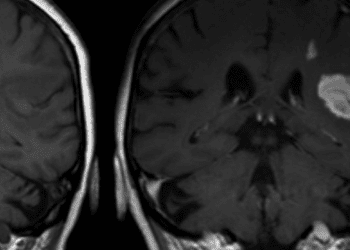MIND diet does not prevent cognitive decline as compared to caloric restriction
1. In this randomized controlled trial, there were no significant differences in the Montreal Cognitive Assessment (MoCA) scores of older adults on the Mediterranean-DASH Intervention for Neurodegenerative Delay (MIND) versus a control caloric restriction diet at three-year follow-up.
2. There were also no significant differences in brain magnetic resonance imaging (MRI) findings between the two groups at the end of three years.
Evidence Rating Level: 1 (Excellent)
Study Rundown: There has been growing interest in identifying strategies possibly beneficial towards the prevention of dementia. Dietary modification represents an area of increased interest and investigation. The MIND diet is a modification of both the Mediterranean and Dietary Approaches to Stop Hypertension (DASH) diets aimed at reducing the consumption of foods which have previously been associated with increased risk of cognitive decline. This study utilized a randomized controlled trial design to investigate the effect of the MIND diet on cognition amongst participants with identified risk factors for developing dementia. These include a positive family history, elevated body mass index (BMI), and suboptimal nutrition at baseline. Results of the study found that participants who adhered to the MIND diet with some restriction in caloric intake did not demonstrate significantly different scores on tests of cognition at the end of three years, compared to participants within the control group. Similarly, there were no significant differences in changes to brain morphology based on MRI. A key limitation to the generalizability of this study is the exclusion of participants without preexisting risk factors for dementia. Further, the majority of the participants included obtained high levels of education and were of European descent. In summary, this study did not demonstrate improved cognitive outcomes in older adults using the MIND diet as compared to controls on caloric restriction.
Click to read the study in NEJM
In-Depth [randomized controlled trial]: This study was a randomized controlled trial evaluating the effect of the MIND diet on cognition among patients with risk factors for developing dementia as compared to those on a control caloric restriction diet. The primary outcome of interest was a change in scores on tests evaluating global cognition and cognitive domains over a three-year follow-up. Participants over the age of 65 years old, with suboptimal nutrition were included. Those with a baseline score of lower than 22 on the MoCA, with no family history of Alzheimer’s dementia, and with a normal or lower-than-average BMI were excluded. After the application of the inclusion and exclusion criteria, 604 participants were randomized in a 1:1 ratio to adhere to the MIND diet with mild caloric restriction or to the control diet with mild caloric restriction. The primary results of the analysis found that there was no significant difference in global cognition scores between the two groups at the end of three years (p=0.23). However, both groups demonstrated improvement in their global cognition scores at the end of the follow-up compared to baseline. Similarly, there were no significant differences in changes identified in imaging studies between the two groups. Overall, this study demonstrated that the MIND diet with mild caloric restriction did not significantly change metrics of cognition amongst participants with known risk factors for developing dementia.
Image: PD
©2023 2 Minute Medicine, Inc. All rights reserved. No works may be reproduced without expressed written consent from 2 Minute Medicine, Inc. Inquire about licensing here. No article should be construed as medical advice and is not intended as such by the authors or by 2 Minute Medicine, Inc.







